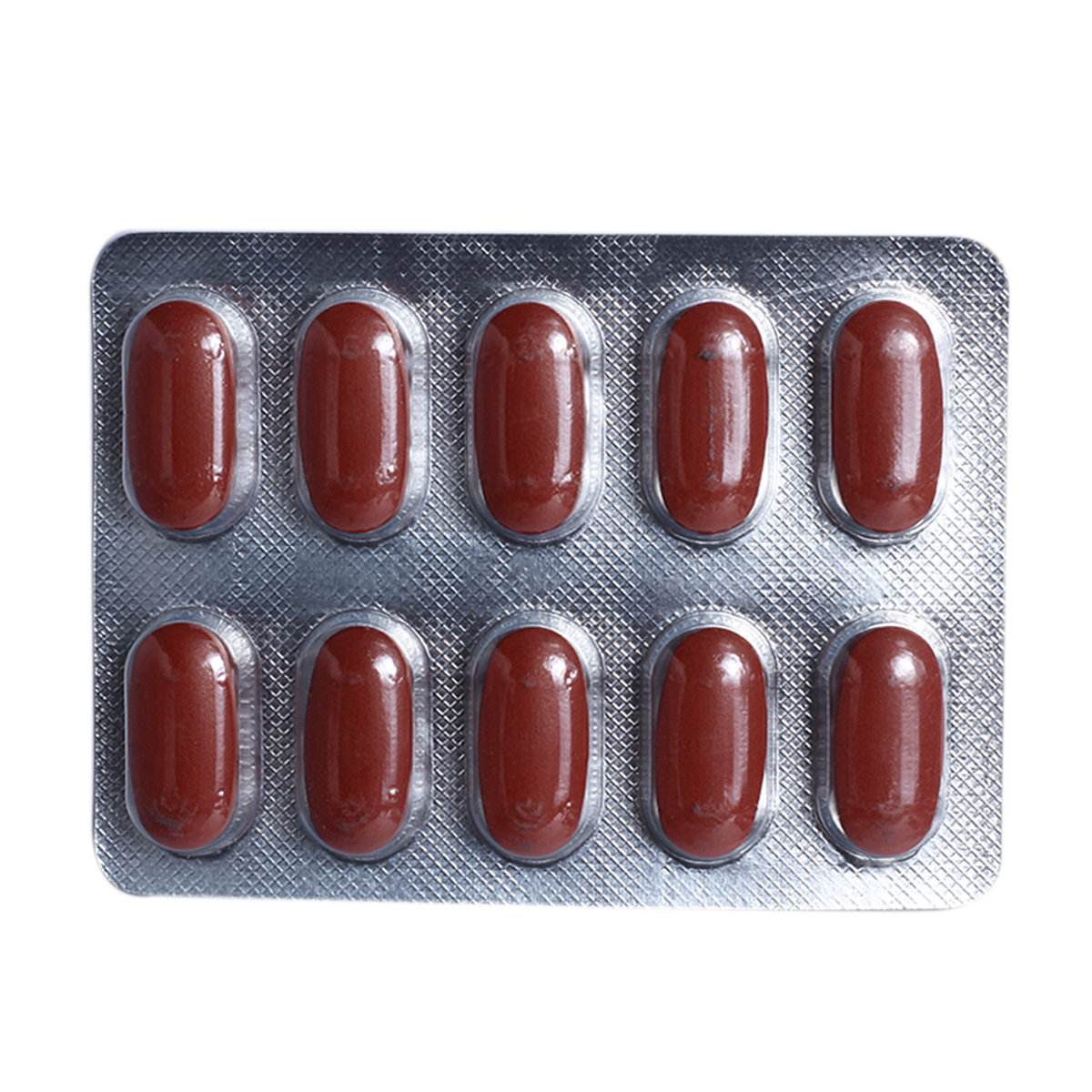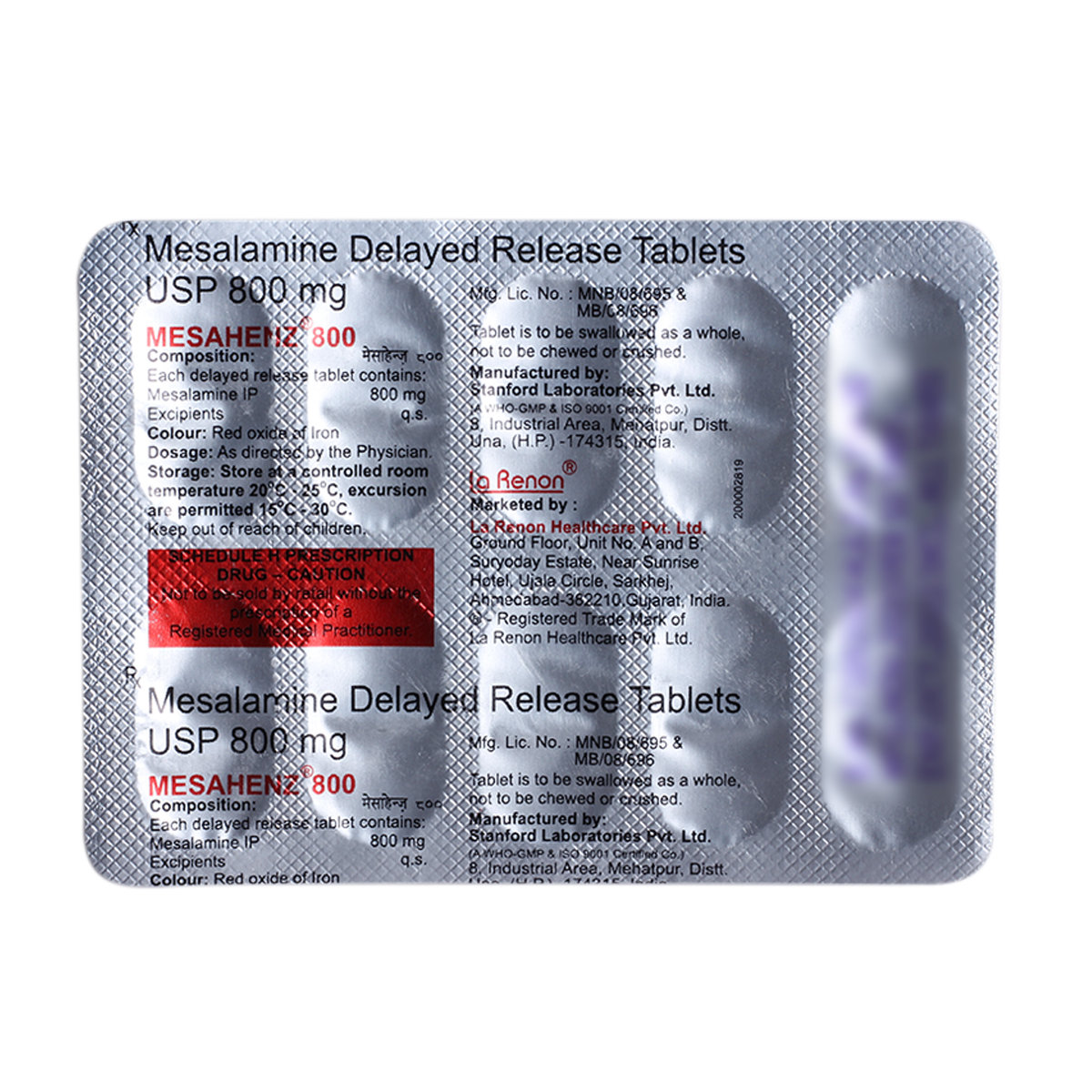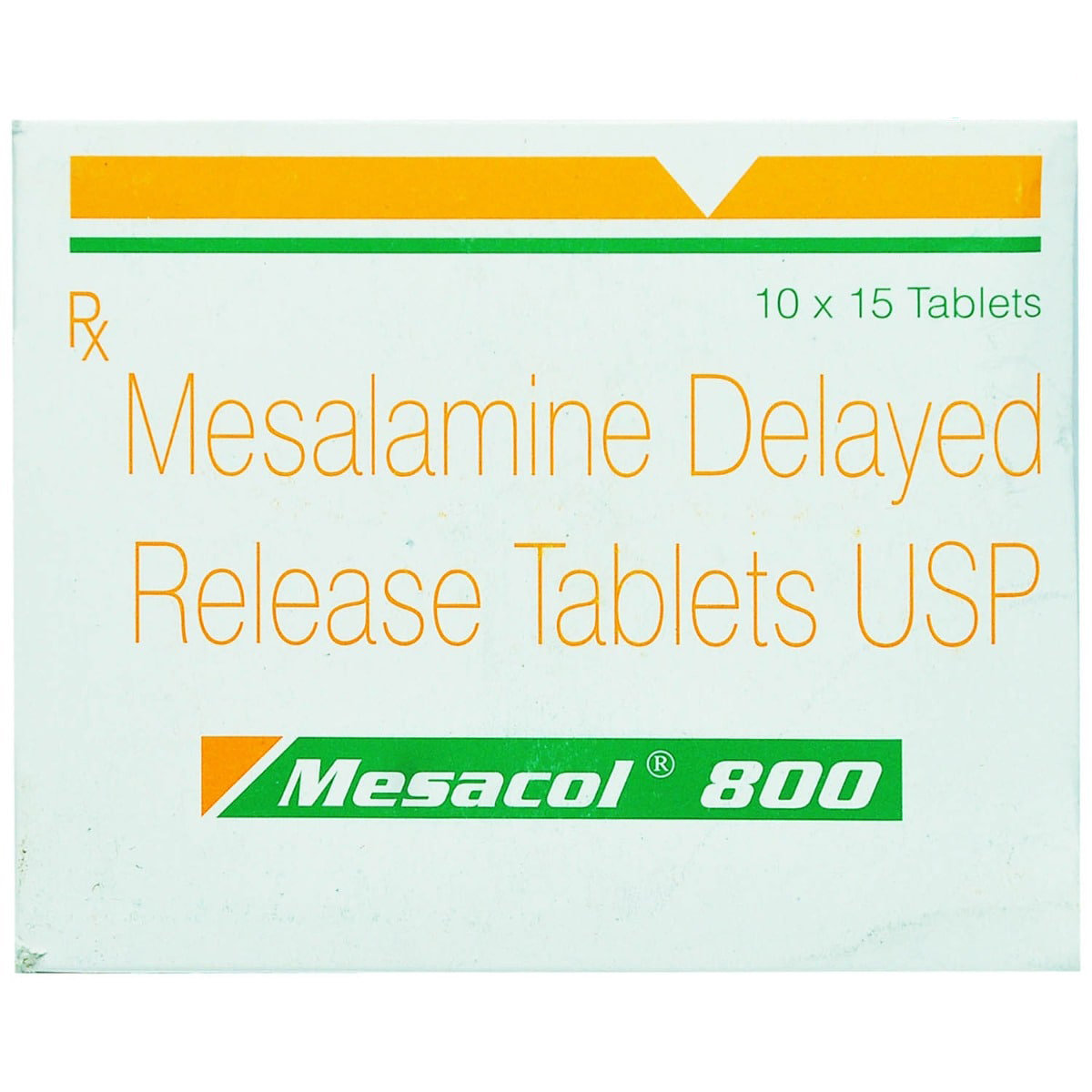Mesahenz 800 Tablet 10's
MRP ₹173.5
(Inclusive of all Taxes)
₹26.0 Cashback (15%)
Provide Delivery Location
Online payment accepted
 Prescription drug
Prescription drugWhats That
Composition :
Manufacturer/Marketer :
Consume Type :
Expires on or after :
Return Policy :
About Mesahenz 800 Tablet
Mesahenz 800 Tablet belongs to a class of drugs called 'anti-inflammatory drugs used to treat ulcerative colitis and Crohn’s disease. Ulcerative colitis is a type of chronic inflammatory bowel disease that causes inflammation of the large intestine lining (colon). It produces ulcers on the colon's lining, which may cause bleeding and discharge of pus and mucus.
Mesahenz 800 Tablet contains Mesalamine, which works by inhibiting the production of certain chemical substances, such as prostaglandins, that cause pain and swelling. Thereby, it reduces inflammation (swelling) in the intestines and provides relief from symptoms such as stomach pain or bleeding.
Take Mesahenz 800 Tablet as prescribed. You are advised to use Mesahenz 800 Tablet for as long as your doctor has recommended it for you based on your medical condition. In some cases, you may experience diarrhoea, stomach pain, headache, nausea, vomiting or flatulence (gas). Most of these side effects of Mesahenz 800 Tablet do not require medical attention and gradually resolve over time. However, if the side effects persist or worsen, please consult your doctor.
Inform your doctor if you are allergic to any components present in Mesahenz 800 Tablet . Mesahenz 800 Tablet should be used with caution in the elderly. If you are pregnant or breastfeeding, please inform your doctor before taking Mesahenz 800 Tablet . Mesalamine tablet is not recommended for children below two years, and granules are not recommended for children below six years. However, Mesahenz 800 Tablet should be given to children only if advised by a doctor. Avoid taking Mesahenz 800 Tablet if you have severe kidney failure. If you have stomach pain, cramps, severe headache, fever or rash, stop taking Mesahenz 800 Tablet immediately and consult a doctor.
Uses of Mesahenz 800 Tablet
Directions for Use
Key Benefits
Mesahenz 800 Tablet contains Mesalamine, an anti-inflammatory drug used to treat ulcerative colitis and Crohn’s disease. It works by inhibiting the production of certain chemical substances, such as prostaglandins, that cause pain and swelling. Thereby helping reduce inflammation (redness and swelling) in the intestines and providing relief from symptoms such as stomach pain or bleeding. Also, Mesahenz 800 Tablet may prevent further episodes of ulcerative colitis.
Storage
- Eating and drinking slowly can help swallow less air, which reduces burps.
- Avoid consuming foods like gum and hard candy and drinking carbonated drinks as they release carbon dioxide gas in your body.
- Prevent smoking as it can impact your whole body.
- Seek medical help to treat gastric problems and heart burn that may lead to frequent burps.
- Check your dentures because if they are loosely fit, excess air can be swallowed that causes burbs more frequently.
- If you have bowel inflammation, eat smaller quantities and more frequent meals.
- Eat slowly and chew your food thoroughly to help digestion.
- Eat fiber-rich foods such as fruits, whole grains, and vegetables to promote regular bowel movements.
- Avoid gas-producing foods like cabbage, beans, broccoli and carbonated drinks.
- Drink lots of water throughout the day to prevent dehydration and aid digestion.
- Do regular exercise to enhance digestion and reduce bloating.
- Hydrate your body: Drink enough water to prevent dehydration and headaches.
- Calm Your Mind: Deep breathing and meditation can help you relax and relieve stress.
- Rest and Recharge: Sleep for 7-8 hours to reduce headache triggers.
- Take rest: lie down in a quiet, dark environment.
- Cold or warm compresses can help reduce tension.
- Stay Upright: Maintain good posture to keep symptoms from getting worse.
- To treat headaches naturally, try acupuncture or massage therapy.
- Over-the-counter pain relievers include acetaminophen and ibuprofen.
- Prescription Assistance: Speak with your doctor about more substantial drug alternatives.
- Severe Headaches: Seek emergency medical assistance for sudden, severe headaches.
- Frequent Headaches: If you get reoccurring headaches, consult your doctor.
- Headaches with Symptoms: Seek medical attention if your headaches include fever, disorientation, or weakness.
- Apply a hot/cold pack to the affected area.
- Doing gentle exercises can help cope with pain by stretching muscles.
- Get enough sleep. It helps enhance mood and lower pain sensitivity.
- Avoid alcohol, smoking and tobacco as they can increase pain.
- Follow a well-balanced meal.
- Meditation and massages may also help with pain.
- Inform your doctor about the common cold symptoms you're experiencing due to medication.
- Your doctor may adjust your treatment plan, which could include changing your medication, adding new medications, or offering advice on managing your symptoms.
- Practice good hygiene, including frequent handwashing, avoiding close contact with others, and avoiding sharing utensils or personal items.
- Drink plenty of fluids, such as warm water or soup, to help thin out mucus.
- Get plenty of rest and engage in stress-reducing activities to help your body recover. If your symptoms don't subside or worsen, consult your doctor for further guidance.
- Inform your doctor about dizziness symptoms. They may adjust your medication regimen or prescribe additional medications to manage symptoms.
- Follow your doctor's instructions for taking medication, and take it at the same time every day to minimize dizziness.
- When standing up, do so slowly and carefully to avoid sudden dizziness.
- Avoid making sudden movements, such as turning or bending quickly, which can exacerbate dizziness.
- Drink plenty of water throughout the day to stay hydrated and help alleviate dizziness symptoms.
- If you're feeling dizzy, sit or lie down and rest until the dizziness passes.
- Track when dizziness occurs and any factors that may trigger it, and share this information with your doctor to help manage symptoms.
- Report the itching to your doctor immediately; they may need to change your medication or dosage.
- Use a cool, damp cloth on the itchy area to help soothe and calm the skin, reducing itching and inflammation.
- Keep your skin hydrated and healthy with gentle, fragrance-free moisturizers.
- Try not to scratch, as this can worsen the itching and irritate your skin.
- If your doctor prescribes, you can take oral medications or apply topical creams or ointments to help relieve itching.
- Track your itching symptoms and follow your doctor's guidance to adjust your treatment plan if needed. If the itching persists, consult your doctor for further advice.
Drug Warnings
Inform your doctor if you're allergic to any ingredient in the Mesahenz 800 Tablet . Mesahenz 800 Tablet should be used with caution in the elderly. If you are pregnant or breastfeeding, inform your doctor before taking Mesahenz 800 Tablet . Avoid taking Mesahenz 800 Tablet if you have severe kidney failure. Severe skin reactions such as toxic epidermal necrolysis (skin peeling and blistering) or Stevens-Johnson syndrome (a painful rash that spreads and blisters) can occur in some patients taking Mesahenz 800 Tablet . Therefore, if you notice any skin reactions while taking Mesahenz 800 Tablet , please consult a doctor immediately. If you have stomach pain, cramps, severe headache, fever or rash, stop taking Mesahenz 800 Tablet immediately and consult a doctor. Avoid taking Mesahenz 800 Tablet if you have had blood abnormalities or kidney problems while taking other medicines such as Sulphasalazine.
Drug-Drug Interactions
Drug-Drug Interactions
Login/Sign Up
Co-administration of Mesahenz 800 Tablet with Cidofovir can increase the risk of kidney problems.
How to manage the interaction:
Taking Mesahenz 800 Tablet with Cidofovir is generally avoided as it can possibly result in an interaction, it can be taken if a doctor has advised it. However, if you experience increased or decreased urination, sudden weight gain or loss, shortness of breath, consult a doctor. Do not discontinue any medications without consulting a doctor.
Co-administration of omeprazole with Mesahenz 800 Tablet can decrease the effects of Mesahenz 800 Tablet.
How to manage the interaction:
There could be a possible interaction between Mesahenz 800 Tablet and omeprazole, but they can be taken together if a doctor has prescribed them. Do not discontinue any medications without consulting a doctor.
Co-administration of Tenofovir alafenamide with Mesahenz 800 Tablet may increase the risk of kidney problems.
How to manage the interaction:
There is a possibility of interaction between Mesahenz 800 Tablet with Tenofovir alafenamide, but they can be taken together if a doctor has prescribed them. Consult a doctor immediately if you experience increased or decreased urination, swelling, shortness of breath, bone pain, cramping in the muscles. Do not discontinue the medication without consulting a doctor.
Co-administration of Metrizamide with Mesahenz 800 Tablet may increase the risk of kidney problems.
How to manage the interaction:
Although, there is a possibility of interaction between Mesahenz 800 Tablet with Metrizamide they can be taken together if a doctor has prescribed them. Consult a doctor immediately if you experience any symptoms such as swelling in feet and ankles, dry, itchy skin, urinating either too much or too little. Do not discontinue any medication without consulting a doctor.
Co-administration of Nizatidine with Mesahenz 800 Tablet can decrease the level or effect of Mesalamine by increasing gastric pH.
How to manage the interaction:
Although there may be a possible interaction between Mesahenz 800 Tablet with Nizatidine, they can be taken together if a doctor has prescribed them. Do not discontinue any medications without consulting a doctor.
Co-administration of Iodamide with Mesahenz 800 Tablet may increase the risk of kidney problems.
How to manage the interaction:
Although, there is a possibility of interaction between Mesalamine with Iodamine they can be taken together if a doctor has prescribed them. Consult a doctor immediately if you experience any symptoms such as swelling in feet and ankles, itchy skin, shortness of breath, urinating either too much or too little. Do not discontinue any medication without consulting a doctor.
Co-administration of Ranitidine with Mesahenz 800 Tablet can decrease the levels of Mesahenz 800 Tablet, which may be less effective in treating a condition.
How to manage the interaction:
There may be a possible interaction between Mesahenz 800 Tablet with Ranitidine, but they can be taken together if a doctor has prescribed them. Do not discontinue any medications without consulting a doctor.
Co-administration of Deferasirox with Mesahenz 800 Tablet may increase the risk of kidney problems.
How to manage the interaction:
Although there is a possibility of interaction between Mesahenz 800 Tablet and Deferasirox but they can be taken together if a doctor has prescribed them. Consult a doctor immediately if you experience any symptoms such as increased or decreased urination, abrupt weight gain or loss, weakness, or dizziness. Do not discontinue the medication without consulting a doctor.
Co-administration of Iomeprol with Mesahenz 800 Tablet may increase the risk of kidney problems.
How to manage the interaction:
Although, there is a possibility of interaction between Mesahenz 800 Tablet and Iomeprol they can be taken together if your doctor has prescribed them. Consult a doctor immediately if you experience any symptoms such as swelling in feet and ankles, urinating either too much or too little. Do not discontinue any medication without consulting a doctor.
Drug-Food Interactions
Drug-Food Interactions
Login/Sign Up
Diet & Lifestyle Advise
- Maintain a low-fat diet and eat foods rich in vitamin C, such as bell peppers, spinach, parsley, and berries, to help heal faster.
- Include olive oil and omega-3 fatty acids.
- Eat more fibre-rich foods such as fruits and vegetables.
- Limit dairy intake as your body may develop difficulty digesting certain dairy products when affected with Crohn’s disease, leading to stomach cramps, diarrhoea, or stomach upset.
- Drink plenty of water to prevent dehydration.
Side Effects of Mesahenz 800 Tablet
- Diarrhoea
- Stomach pain
- Headache
- Nausea
- Vomiting
- Flatulence (gas)
Habit Forming
Therapeutic Class
All Substitutes & Brand Comparisons
RX
Out of StockColoncop 800 Tablet 15's
Mankind Pharma Pvt Ltd
₹290.5
(₹19.37 per unit)
24% COSTLIERRX
Mesacol 800 Tablet 15's
Sun Pharmaceutical Industries Ltd
₹342
(₹20.52 per unit)
31% COSTLIER
Author Details
We provide you with authentic, trustworthy and relevant information
Drug-Diseases Interactions
Drug-Diseases Interactions
Login/Sign Up
FAQs
Drug-Drug Interactions Checker List
- LACTULOSE
- ASPIRIN
- IBUPROFEN
- AZATHIOPRINE
- THIOGUANINE
- MERCAPTOPURINE
Special Advise
- Blood and urine tests are recommended before and during the treatment with Mesahenz 800 Tablet to monitor the functioning of the kidney, liver, and blood.
Disease/Condition Glossary
Ulcerative colitis: Ulcerative colitis is a type of chronic inflammatory bowel disease that causes inflammation of the lining of the large intestine (colon) and produces ulcers on the lining of the colon, which may cause bleeding and discharge of pus and mucus. The common symptoms include bloody stools, stomach pain, rectal pain, diarrhoea, fever, or weight loss. Additionally, it may cause other problems such as joint pain or swelling, mouth sores, skin problems, decreased appetite, or nausea. The factors involved in causing ulcerative colitis include immune disorders, environmental factors like viruses, bacteria, or antigens, which may trigger the immune system, and genes inherited from the parent.
Crohn’s disease: Crohn’s disease is a type of chronic inflammatory bowel disease that can affect any part of the gastrointestinal tract, from mouth to anus. But mostly occurs in the small intestine and large intestine. The symptoms include blood in stools, stomach cramps, tiredness, diarrhoea, fever, weight loss, or loss of appetite.

Have a query?
Alcohol
Safe if prescribed
It is unknown whether it is safe to consume alcohol with Mesahenz 800 Tablet . However, as a precautionary measure, it is advisable not to take or limit alcohol.
Pregnancy
Consult your doctor
Mesahenz 800 Tablet should not be used in pregnancy unless necessary. So, inform your doctor if you are pregnant or suspect pregnancy. Your doctor will weigh the benefits and potential risks before prescribing this medicine.
Breast Feeding
Consult your doctor
Mesahenz 800 Tablet should not be used in nursing mothers unless necessary. So, inform your doctor if you are a nursing mother. Your doctor will weigh the benefits and potential risks before prescribing this medicine.
Driving
Safe if prescribed
Mesahenz 800 Tablet usually does not affect your ability to drive or operate machinery.
Liver
Consult your doctor
Limited information is available about using Mesahenz 800 Tablet in patients with liver disease. Inform your doctor before taking Mesahenz 800 Tablet if you have a history of liver diseases/conditions. Your doctor will prescribe only if the benefits outweigh the risks.
Kidney
Consult your doctor
Inform your doctor before taking Mesahenz 800 Tablet if you have a history of kidney diseases/conditions. Mesahenz 800 Tablet should be used with extreme caution in patients with mild to moderate kidney impairment. It is recommended not to take Mesahenz 800 Tablet if you have severe kidney impairment.
Children
Safe if prescribed
Mesalamine tablet is not recommended for children below two years, and granules are not recommended for children below six years. However, Mesahenz 800 Tablet should be given to children only if recommended by a doctor.











